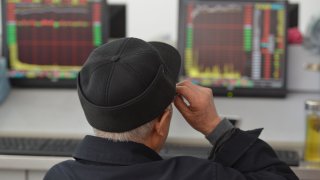
- HSBC's Herald van der Linde sees opportunities now to buy Chinese stocks "at reasonable valuations."
- Speaking with CNBC's "Street Signs Asia" on Tuesday, Van Der Linde said investors should be buying Chinese stocks.
- Elsewhere in the region, the strategist said Southeast Asia's markets also "look pretty good" as the Covid situation there appears to have moderated.
HSBC's Herald van der Linde sees opportunities to buy Chinese stocks "at reasonable valuations" now.
"We believe investors should be buying, actually, Chinese stocks," van der Linde, head of equity strategy for Asia-Pacific at the bank, told CNBC's "Street Signs Asia" on Tuesday. HSBC is currently "overweight" on Chinese stocks, he said.
Get a weekly recap of the latest San Francisco Bay Area housing news. Sign up for NBC Bay Area’s Housing Deconstructed newsletter.
"Good stocks have been thrown out of, like they say, the baby's been thrown away with the … bathwater," the strategist said, adding that these shares are now trading at "very low multiples."
The Chinese markets are also relatively inexpensive as compared with peers in the U.S. and India, van der Linde said.
Investors have been cautious toward Chinese stocks for most of this year due to a range of factors such as Beijing's ongoing regulatory crackdown as well as fears of contagion over debt-laden developer China Evergrande Group.
Money Report
While major indexes in the U.S. as well as India have surged to record highs in recent weeks, China's CSI 300 index, which tracks the largest mainland-listed stocks, has fallen nearly 5% in 2021 as of its Tuesday close. In Hong Kong, where shares of Chinese tech giants such as Alibaba and Tencent are listed, the benchmark Hang Seng index has tumbled more than 4% for the year.
"Most people are heavily underweight [on China], so I think there's actually opportunities to buy these stocks at reasonable valuations," he said. "It's a market people should be looking at."
Elsewhere, van der Linde said Southeast Asia markets "look pretty good" as the Covid situation in the region appears to have moderated.
"A lot of people have fled those markets," he said. "They've gone out, they're underweight, they didn't want exposure."
"There's a lot of people who can buy more in China, in ASEAN, the valuations are low, that's where you wanna go," the strategist said.






